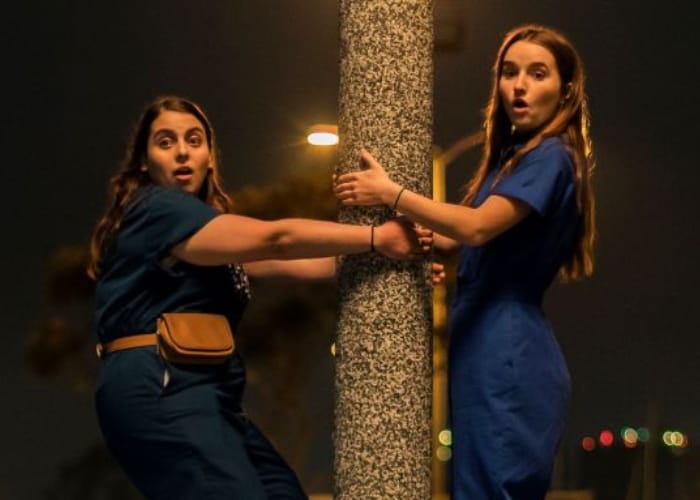There are few better feelings in life than settling onto a plane with some complimentary pretzels, ginger ale in hand, and a plethora of in-flight movie offerings to choose from. These movies usually receive a different standard of editing than their theatrical versions, considering airlines’ desire to appeal to all customers. But recently, travelers have noticed something off about certain titles that were re-cut for the skies. In both Booksmart and Rocketman, the omission of same-sex love scenes caused backlash for airlines — Delta in particular — and confusion over who exactly should be held responsible for the censorship.
In a Twitter thread on October 30th, Booksmart director Olivia Wilde reviewed the changes to the edited version, which she witnessed while flying Delta, and summed up the dispute: “Turns out some airlines work with a third party company that edits the movie based on what they deem inappropriate. Which, in our case, is … female sexuality?” Wilde continued that the third-party “muted or cut the word ‘vagina,’” kept the swear words, tragically “cut the porn moment in the Lyft (our Oscar clip),” and “most disappointingly, they cut most of Amy [Kaitlyn Dever] and Hope’s [Diana Silvers] love scene in the bathroom, which involves zero nudity, but does involve an essential plot point for a lead character.”
In a statement to The Hollywood Reporter on November 1st, a Delta spokesperson said, “We are immediately putting a new process in place for managing content available through Delta’s in-flight entertainment. Studios often provide videos in two forms: a theatrical, original version and an edited version. We selected the edited version and now realize content well within our guidelines was unnecessarily excluded from both films. We are working to make sure this doesn’t happen again.” After news broke that Booksmart and Rocketman would be re-edited, Wilde tweeted that evening, “Thank you, Delta.”
In spite of Delta’s reversal, this specific censorship of sexual expression is likely to continue without sweeping changes to airlines’ policies (Delta isn’t the only company using the same third-party content distributors), though the cuts actually benefit no one. Neither film’s theatrical cut is glaringly sexual in comparison to the vast number of films with heterosexual sex scenes. They are not violent, nonconsensual, or even that explicit. The most pearl-clutching Booksmart viewers would still be offended by the generous use of the f-bomb that remained in the Delta version. And who could be fooled by a version of Elton John’s life story that conveniently edits out homosexuality?
On a larger level, editing out same-sex intimacy does a disservice to the viewer, even (and maybe especially) those who are straight. Portraying same-sex relationships as truly equal to straight partnerships helps to normalize LGBT representation, and editing out the most important scenes sends a clear message. LGBT passengers looking to enjoy even slightly queer cinema on their flights are overtly reminded that even thousands of feet off the ground, they cannot escape prejudice and erasure. At best, the third-party distributors are catering to the lowest common denominator of homophobia and at worst, they are unwittingly turning back the progress that has been hard-won for meaningful LGBT inclusion in mainstream cinema.
Generally, censorship and selectivity for in-flight entertainment is normal and expected within boundaries. In 1988, airlines understandably edited out the Rain Man scene about the dangers of flying and fatality statistics. And Sully (2016) was not chosen by most airlines as an in-flight movie option due to the potential for anxious passengers, despite its happy ending. Films that remind people of plane crashes or terrorism while securely fastened to their seats are a sure way to increase the sales of Amtrak tickets, perhaps explaining the greater number of feel-good comedies in the airlines’ menu.
Awareness of cultural norms also affects censorship. What’s widely acceptable for an American audience can receive a vastly different reaction from a European or non-Western audience. Some nudity is generally more normalized in European media than graphic violence, whereas violence is accepted and nudity more stigmatized for American and Middle Eastern viewers. This can sometimes lead to a baffling double standard for what’s acceptable in-flight entertainment, and this tension is clear in the Booksmart controversy, especially regarding female sexuality.
Planes are privately operated spaces that also function as a temporary public melting pot in the air. Airlines must accommodate babies, the elderly, and cultures from all over the world in tightly-cramped quarters — all while keeping everyone safe and entertained. How do the lines get drawn over what’s acceptable to watch, and who gets left on the cutting room floor?
Like the debacle over Facebook and Twitter’s advertisement policies and free speech, there are gray areas when it comes to policing content for a large number of users or consumers, but brands have found it’s impossible to remain neutral when people’s identities are on the line. If the third-party distributors and airlines choose hard-line, puritanical policies of what passengers can view, LGBT films could be mangled, re-dubbed, and re-edited beyond recognition. Passengers may be unaware that the edit was made by the third-party rather than the filmmaker themselves — unless directors like Wilde put pressure on the airlines to be transparent about the omissions, or adapt to the shifting cultural norms around women’s sexuality and LGBT equality.
Over the past few years, there has been much public debate over “outrage culture” and people being too easily offended these days. If the presence of same-sex love scenes is so offensive to a subset of airplane passengers after reading the film’s parental advisory warning, there are plenty of other ways to kill time on a long flight. A simple solution would be to peruse the seat pocket magazine, read the safety instructions, stare out the window, or take a nap instead.

